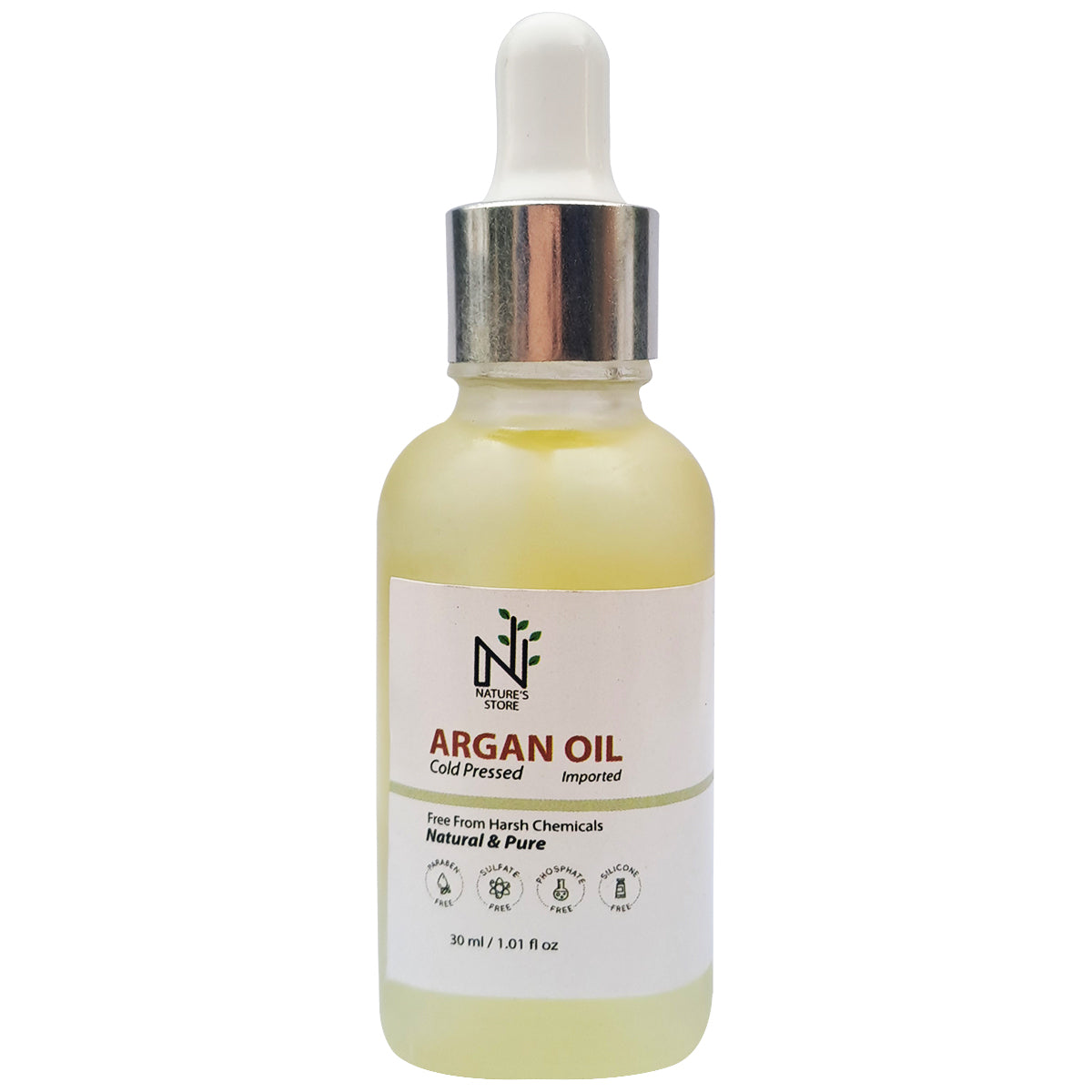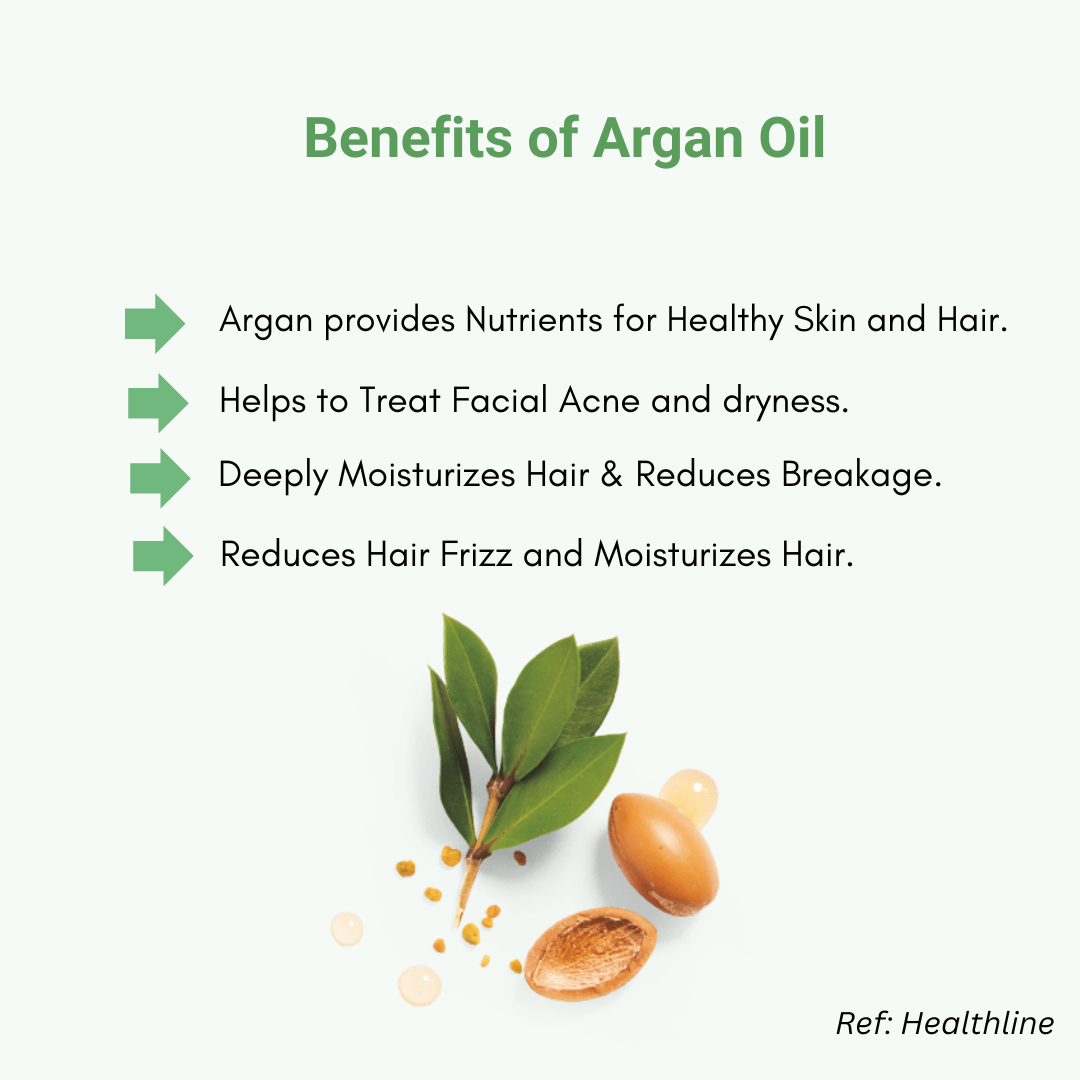The Nature's Store
Argan Oil
Argan Oil
Description



Argan oil (آرگن آئل) also known as "liquid gold," is a natural oil extracted from the kernels of the argan tree (Argania spinosa), which is native to Morocco.
Benefits
Argan oil benefits for skin
Some of the benefits of argan oil for the skin include:
- Hydration: Argan oil may improve skin by restoring the skin’s barrier function and retaining moisture.
- Elasticity: Argan oil can improve skin elasticity, which may help reduce the appearance of stretch marks
- Wound healing: Argan oil may help treat second-degree burn wounds. However, studies on humans are needed to evaluate this benefit further.
Argan oil benefits for hair
Currently, there is not enough clinical Source to suggest argan oil has specific benefits for hair.
However, anecdotally people may use argan oil for the following:
- adding lighter moisture that does not weigh hair down
- improving hair elasticity and manageability
- preventing hair breakage
- enhancing hair shine
- minimizing frizz
Ref: https://www.medicalnewstoday.com/articles/argan-oil-benefits#hair-benefits
How to Use
How to Use Argan Oil on Skin:
Apply a few drops of argan oil onto clean, damp skin and massage gently until fully absorbed. It can be used as a standalone moisturizer or mixed with other skincare products for added hydration and nourishment.
How to Use Argan Oil on Hair:
Warm a small amount of argan oil in your palms and apply it to damp or dry hair, focusing on the mid-lengths and ends. Avoid the scalp if you have oily hair. Use it as a leave-in conditioner or as a pre-shampoo treatment by applying it generously to the hair and leaving it on for at least 30 minutes before shampooing and conditioning as usual.
Disclaimer
While argan oil is generally safe for most skin and hair types, it's essential to perform a patch test before using it extensively, especially if you have sensitive skin or allergies. Discontinue use if you experience any irritation or adverse reactions. Additionally, consult with a dermatologist or healthcare professional if you have specific concerns about incorporating argan oil into your skincare or haircare routine.
Please click on the link below for full disclaimer:
https://thenaturesstore.com/pages/medical-disclaimer-for-skin-and-hair-products
FAQ's
- Is argan oil comedogenic?
Argan oil is considered non-comedogenic, meaning it is unlikely to clog pores and cause acne breakouts. It's suitable for most skin types, including oily and acne-prone skin.
2. Can argan oil be used on sensitive skin?
Yes, argan oil is gentle and well-tolerated by sensitive skin, but it's advisable to perform a patch test before extensive use to check for any allergic reactions.
3. Does argan oil help with acne scars?
Argan oil's moisturizing and regenerative properties may help reduce the appearance of acne scars over time, although individual results may vary.
4. Can argan oil be used as a makeup remover?
Yes, argan oil can effectively remove makeup, including waterproof formulas, without stripping the skin of its natural oils.
5. Does argan oil have a strong scent?
Argan oil has a mild, nutty aroma that dissipates quickly after application.
6. Can argan oil be used on chemically-treated hair?
Yes, argan oil is beneficial for chemically-treated hair as it helps repair damage and restore moisture, leaving hair soft and manageable.
7. Does argan oil protect hair from heat styling damage?
While argan oil provides some protection against heat styling tools, it's best used in conjunction with other heat protectant products for maximum efficacy.
8. Can argan oil be used on oily hair?
Yes, argan oil can be used on oily hair, but it's important to apply it sparingly to avoid weighing down the hair and exacerbating oiliness.
9. What is the Urdu name for Argan Oil?
روغن آرگن
10. Why is argan oil so expensive?
Argan oil is expensive due to its labor-intensive production, limited availability from argan trees native to Morocco, and the large quantity of nuts required for a small yield. Traditional extraction methods, high global demand for its beauty and culinary benefits, sustainable harvesting practices, and strict quality standards also contribute to its high cost.
11. What country is known for argan oil?
Morocco is the country known for argan oil. The argan tree (Argania spinosa) is native to Morocco and primarily grows in the semi-desert regions of the country. Moroccan women in cooperatives traditionally produce the oil, making it a significant part of the country's culture and economy.
12. How to check if argan oil is pure?
- Check the Color
- Pure argan oil typically has a golden yellow color (cosmetic grade) or a lighter shade (culinary grade).
- If it's too pale or overly dark, it might not be pure.
- Smell the Oil
- Pure argan oil has a mild, nutty aroma.
- If it has no smell, a chemical smell, or a very strong perfume-like scent, it may not be pure.
- Feel the Texture
- It should be smooth and non-greasy, absorbing quickly into the skin.
- A sticky or overly greasy texture suggests impurities or dilution.
13. Is it OK to use argan oil everyday?
Yes, it is absolutely fine to use Argan oil everyday.
14. What is the original color of argan oil?
It has a golden yellow color, which is rich but not overly bright.
15. What is pure argan oil made from?
The kernels are then cold-pressed (without heat) to extract the oil. This method preserves the nutrients and natural properties of the oil.
16. What does real argan oil smell like?
he scent is subtle and not overpowering. It is often described as natural.
17. Who should not use argan oil?
While argan oil is generally safe for most people, there are certain individuals who should avoid or be cautious when using it:
- People with Nut Allergies:
Since argan oil is derived from the nuts of the argan tree, individuals with nut allergies may experience an allergic reaction. It’s important to do a patch test before using it on a larger area. - Those with Sensitive Skin or Skin Conditions:
People with highly sensitive skin, eczema, or conditions like rosacea should do a patch test before using argan oil, as it may cause irritation or breakouts in some individuals. - People with Oily Skin or Acne-Prone Skin:
Although argan oil is non-comedogenic (it doesn't clog pores), it may still be too heavy for individuals with very oily or acne-prone skin. It’s best to test it on a small area to see how your skin reacts. - Pregnant or Breastfeeding Women (with caution):
There is limited research on the safety of topical use during pregnancy and breastfeeding. Although argan oil is generally considered safe, it's advisable to consult with a healthcare provider first.
18. Does argan oil grow hair?
Argan oil itself does not directly grow hair, but it can promote healthier hair growth by improving the overall health of the scalp and hair follicles. Here’s how it helps:
- Nourishes the Scalp:
Argan oil is rich in essential fatty acids, antioxidants, and vitamin E, which can help keep the scalp healthy, moisturized, and free from dryness or irritation—conditions that can hinder hair growth. - Improves Blood Circulation:
Massaging argan oil into the scalp can help improve blood circulation, which may stimulate hair follicles and encourage hair growth over time. - Prevents Hair Breakage:
Argan oil strengthens the hair shaft, reducing breakage and split ends. While this doesn’t directly cause new hair growth, it can make existing hair appear thicker and healthier. - Reduces Hair Fall:
By keeping the hair and scalp well-nourished, argan oil may help reduce hair fall due to dryness, brittleness, or scalp conditions like dandruff. - Promotes Shiny, Soft Hair:
Argan oil adds shine, smoothness, and softness to the hair, making it look fuller and healthier, which can indirectly contribute to the appearance of thicker hair.
19. What is another name for argan oil?
Argania Spinosa Kernel Oil (argan oil), also known as the 'liquid gold of Morocco'.
20. Which oil can replace argan oil?
Several oils can be used as alternatives to argan oil, depending on your needs. Here are some common ones:
- Jojoba Oil
- Avocado Oil
- Almond Oil
- Apricot Oil
- Walnut Oil
21. Can I use argan oil on my face?
Avoid using Argan Oil if you have oily face as it can cause acne.
22. Which oil absorbs fastest into skin?
Jojoba Oil, Almond Oil, Apricot Oil can absorb fastest into the skin.
Share


Note: Our Testimonials consist of authentic submissions from customers, supplemented by feedback obtained through telephone conversations and various social media platforms.
Really good for shiney hair and plump skin.
Thank you for your message.


